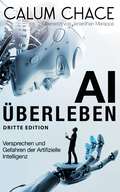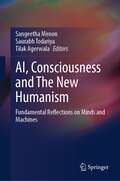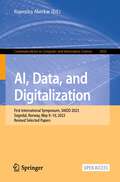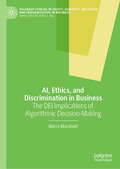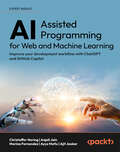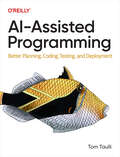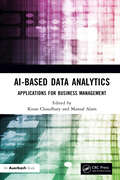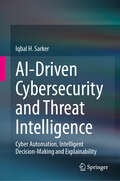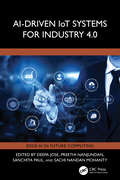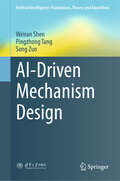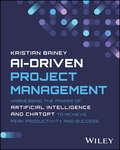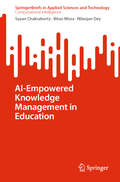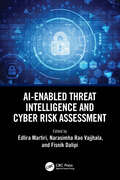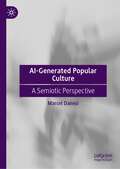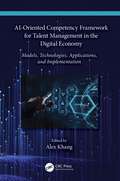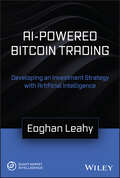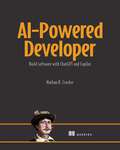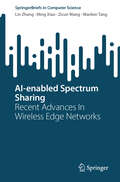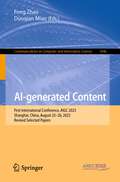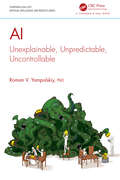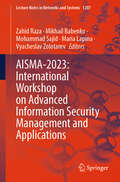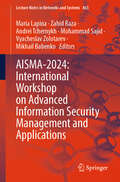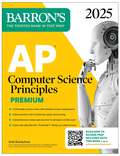- Table View
- List View
AI überleben: Das Versprechen und die Gefahr Artifizielle Intelligenz
by Janardhan MarappaDies ist das Jahrhundert zweier Singularitäten – der wirtschaftlichen Singularität (technologische Arbeitslosigkeit) und der technologischen Singularität (Intelligenzexplosion). Beides birgt enorme Chancen und enorme Herausforderungen. Wenn wir sie erfolgreich verwalten, ist unsere Zukunft als Spezies mehr als wunderbar. Wenn wir versagen, könnte es miserabel sein - und vielleicht kurz. Der Treiber ist Artifizelle Intelligenz (AI) - die leistungsstärkste Technologie der Menschheit. Software, die Probleme löst und Daten in Erkenntnisse umwandelt, hat unser Leben bereits revolutioniert, und die Revolution beschleunigt sich. Das Argument dieses Buches ist, dass wir die stattfindenden Veränderungen überwachen und Richtlinien verabschieden sollten, die die bestmöglichen Ergebnisse fördern. Die Bandbreite der möglichen Ergebnisse ist groß, vom Schrecklichen bis zum Wunderbaren, und sie sind nicht vorherbestimmt. Sie werden zum Teil durch Glück, zum Teil durch ihre eigene interne Logik, zum Teil aber auch durch die Politik auf allen Ebenen der Gesellschaft ausgewählt. Automatisierung und Superintelligenz sind die beiden Entwicklungen, von denen wir bereits sehen, dass sie wahrscheinlich enorme Auswirkungen haben werden. Automatisierung könnte zu einer wirtschaftlichen Singularität und der Entwicklung einer völlig anderen Art von Wirtschaft führen. Wenn wir das falsch verstehen, könnte eine Elite die Produktionsmittel besitzen und den Rest von uns in einem dystopischen technologischen autoritären Regime unterdrücken. Wenn wir es richtig machen, könnten wir eine Wirtschaft des radikalen Überflusses genießen, in der niemand arbeiten muss, um seinen Lebensunterhalt zu verdienen, und wir alle frei sind, Spaß zu haben, unseren Geist zu dehnen und unsere Fähigkeiten voll zu entfalten. Die Ankunft der Superintelligenz wird, falls und wenn sie eintritt, eine technologische Singularität darstellen, die das bedeutendste Ere
AI, Consciousness and The New Humanism: Fundamental Reflections on Minds and Machines
by Sangeetha Menon Tilak Agerwala Saurabh TodariyaThis edited volume presents perspectives from computer science, information theory, neuroscience and brain imaging, aesthetics, social sciences, psychiatry, and philosophy to answer frontier questions related to artificial intelligence and human experience. Can a machine think, believe, aspire and be purposeful as a human? What is the place in the machine world for hope, meaning and transformative enlightenment that inspires human existence? How, or are, the minds of machines different from that of humans and other species? These questions are responded to along with questions in the intersection of health, intelligence and the brain. It highlights the place of consciousness by attempting to respond to questions with the help of fundamental reflections on human existence, its life-purposes and machine intelligence. The volume is a must-read for interdisciplinary and multidisciplinary researchers in humanities and social sciences and philosophy of science who wish to understand the future of AI and society.
AI, Data, and Digitalization: First International Symposium, SAIDD 2023, Sogndal, Norway, May 9–10, 2023, Revised Selected Papers (Communications in Computer and Information Science #1810)
by Rajendra AkerkarThis open access book constitutes the revised selected papers of the First International Symposium on AI, Data and Digitalization, SAIDD 2023, held in Sogndal, Norway, during May 9–10, 2023.The 13 full papers included in this volume were carefully reviewed and selected from 42 submissions. The papers deal with the impact of data and AI on the digital revolution and their contribution to solving societal challenges.
AI, Ethics, and Discrimination in Business: The DEI Implications of Algorithmic Decision-Making (Palgrave Studies in Equity, Diversity, Inclusion, and Indigenization in Business)
by Marco MarabelliThis book takes a historical approach to explore data, algorithms, their use in practice through applications of AI in various settings, and all of the surrounding ethical and DEI implications. Summarizing our current knowledge and highlighting gaps, it offers original examples from empirical research in various settings, such as healthcare, social media, and the GIG economy.The author investigates how systems relying on a binary structure (machines) work in systems that are instead analogic (societies). Further, he examines how underrepresented populations, who have been historically penalized by technologies, can play an active role in the design of automated systems, with a specific focus on the US legal and social system.One issue is that main tasks of machines concern classification, which, while efficient for speeding up decision-making processes, are inherently biased. Ultimately, this work advocates for ethical design and responsible implementation and deployment of technology in organizations and society through through government-sponsored social justice, in contrast with free market policies.This interdisciplinary text contributes to the timely and relevant debate on algorithmic fairness, biases, and potential discriminations. It will appeal to researchers in business ethics and information systems while building on theories from anthropology, psychology, sociology, management, marketing, and economics.
AI-Assisted Programming for Web and Machine Learning: Improve your development workflow with ChatGPT and GitHub Copilot
by Christoffer Noring Anjali Jain Marina Fernandez Ayşe Mutlu Ajit JaokarSpeed up your development processes and improve your productivity by writing practical and relevant prompts to build web applications and Machine Learning (ML) models Purchase of the print or Kindle book includes a free PDF copyKey FeaturesUtilize prompts to enhance frontend and backend web developmentDevelop prompt strategies to build robust machine learning modelsUse GitHub Copilot for data exploration, maintaining existing code bases, and augmenting ML models into web applicationsBook DescriptionAI-Assisted Programming for Web and Machine Learning shows you how to build applications and machine learning models and automate repetitive tasks. Part 1 focuses on coding, from building a user interface to the backend. You’ll use prompts to create the appearance of an app using HTML, styling with CSS, adding behavior with JavaScript, and working with multiple viewports. Next, you’ll build a web API with Python and Flask and refactor the code to improve code readability. Part 1 ends with using GitHub Copilot to improve the maintainability and performance of existing code. Part 2 provides a prompting toolkit for data science from data checking (inspecting data and creating distribution graphs and correlation matrices) to building and optimizing a neural network. You’ll use different prompt strategies for data preprocessing, feature engineering, model selection, training, hyperparameter optimization, and model evaluation for various machine learning models and use cases. The book closes with chapters on advanced techniques on GitHub Copilot and software agents. There are tips on code generation, debugging, and troubleshooting code. You’ll see how simpler and AI-powered agents work and discover tool calling.What you will learnSpeed up your coding and machine learning workflows with GitHub Copilot and ChatGPTUse an AI-assisted approach across the development lifecycle Implement prompt engineering techniques in the data science lifecycleDevelop the frontend and backend of a web application with AI assistance Build machine learning models with GitHub Copilot and ChatGPT Refactor code and fix faults for better efficiency and readability Improve your codebase with rich documentation and enhanced workflows Who this book is forExperienced developers new to GitHub Copilot and ChatGPT can discover the best strategies to improve productivity and deliver projects quicker than traditional methods. This book is ideal for software engineers working on web or machine learning projects. It is also a useful resource for web developers, data scientists, and analysts who want to improve their efficiency with the help of prompting. This book does not teach web development or how different machine learning models work.
AI-Assisted Programming: Better Planning, Coding, Testing, and Deployment
by Tom TaulliGet practical advice on how to leverage AI development tools for all stages of code creation, including requirements, planning, design, coding, debugging, testing, and documentation. With this book, beginners and experienced developers alike will learn how to use a wide range of tools, from general-purpose LLMs (ChatGPT, Gemini, and Claude) to code-specific systems (GitHub Copilot, Tabnine, Cursor, and Amazon CodeWhisperer).You'll also learn about more specialized generative AI tools for tasks such as text-to-image creation.Author Tom Taulli provides a methodology for modular programming that aligns effectively with the way prompts create AI-generated code. This guide also describes the best ways of using general purpose LLMs to learn a programming language, explain code, or convert code from one language to another.This book examines:The core capabilities of AI-based development toolsPros, cons, and use cases of popular systems such as GitHub Copilot and Amazon CodeWhispererWays to use ChatGPT, Gemini, Claude, and other generic LLMs for codingUsing AI development tools for the software development lifecycle, including requirements, planning, coding, debugging, and testingPrompt engineering for developmentUsing AI-assisted programming for tedious tasks like creating regular expressions, starter code, object-oriented programming classes, and GitHub ActionsHow to use AI-based low-code and no-code tools, such as to create professional UIs
AI-Based Data Analytics: Applications for Business Management
by Mansaf Alam Kiran ChaudharyThis book covers various topics related to marketing and business analytics. It explores how organizations can increase their profits by making better decisions in a timely manner through the use of data analytics. This book is meant for students, practitioners, industry professionals, researchers, and academics working in the field of commerce and marketing, big data analytics, and organizational decision-making. Highlights of the book include: The role of Explainable AI in improving customer experiences in e-commerce Sentiment analysis of social media Data analytics in business intelligence Federated learning for business intelligence AI-based planning of business management An AI-based business model innovation in new technologies An analysis of social media marketing and online impulse buying behaviour AI-Based Data Analytics: Applications for Business Management has two primary focuses. The first is on analytics for decision-making and covers big data analytics for market intelligence, data analytics and consumer behavior, and the role of big data analytics in organizational decision-making. The book’s second focus is on digital marketing and includes the prediction of marketing by consumer analytics, web analytics for digital marketing, smart retailing, and leveraging web analytics for optimizing digital marketing strategies.
AI-Driven Cybersecurity and Threat Intelligence: Cyber Automation, Intelligent Decision-Making and Explainability
by Iqbal H. SarkerThis book explores the dynamics of how AI (Artificial Intelligence) technology intersects with cybersecurity challenges and threat intelligence as they evolve. Integrating AI into cybersecurity not only offers enhanced defense mechanisms, but this book introduces a paradigm shift illustrating how one conceptualize, detect and mitigate cyber threats. An in-depth exploration of AI-driven solutions is presented, including machine learning algorithms, data science modeling, generative AI modeling, threat intelligence frameworks and Explainable AI (XAI) models. As a roadmap or comprehensive guide to leveraging AI/XAI to defend digital ecosystems against evolving cyber threats, this book provides insights, modeling, real-world applications and research issues. Throughout this journey, the authors discover innovation, challenges, and opportunities. It provides a holistic perspective on the transformative role of AI in securing the digital world.Overall, the useof AI can transform the way one detects, responds and defends against threats, by enabling proactive threat detection, rapid response and adaptive defense mechanisms. AI-driven cybersecurity systems excel at analyzing vast datasets rapidly, identifying patterns that indicate malicious activities, detecting threats in real time as well as conducting predictive analytics for proactive solution. Moreover, AI enhances the ability to detect anomalies, predict potential threats, and respond swiftly, preventing risks from escalated. As cyber threats become increasingly diverse and relentless, incorporating AI/XAI into cybersecurity is not just a choice, but a necessity for improving resilience and staying ahead of ever-changing threats. This book targets advanced-level students in computer science as a secondary textbook. Researchers and industry professionals working in various areas, such as Cyber AI, Explainable and Responsible AI, Human-AI Collaboration, Automation and Intelligent Systems, Adaptive and Robust Security Systems, Cybersecurity Data Science and Data-Driven Decision Making will also find this book useful as reference book.
AI-Driven IoT Systems for Industry 4.0 (ISSN)
by Sachi Nandan Mohanty Preethi Nanjundan Deepa Jose Sanchita PaulThe purpose of this book is to discuss the trends and key drivers of Internet of Things (IoT) and artificial intelligence (AI) for automation in Industry 4.0. IoT and AI are transforming the industry thus accelerating efficiency and forging a more reliable automated enterprise. AI-driven IoT systems for Industry 4.0 explore current research to be carried out in the cutting-edge areas of AI for advanced analytics, integration of industrial IoT (IIoT) solutions and Edge components, automation in cyber-physical systems, world leading Industry 4.0 frameworks and adaptive supply chains, etc.A thorough exploration of Industry 4.0 is provided, focusing on the challenges of digital transformation and automation. It covers digital connectivity, sensors, and the integration of intelligent thinking and data science. Emphasizing the significance of AI, the chapter delves into optimal decision-making in Industry 4.0. It extensively examines automation and hybrid edge computing architecture, highlighting their applications. The narrative then shifts to IIoT and edge AI, exploring their convergence and the use of edge AI for visual insights in smart factories. The book concludes by discussing the role of AI in constructing digital twins, speeding up product development lifecycles, and offering insights for decision-making in smart factories. Throughout, the emphasis remains on the transformative impact of deep learning and AI in automating and accelerating manufacturing processes within the context of Industry 4.0.This book is intended for undergraduates, postgraduates, academicians, researchers, and industry professionals in industrial and computer engineering.
AI-Driven Mechanism Design (Artificial Intelligence: Foundations, Theory, and Algorithms)
by Weiran Shen Pingzhong Tang Song ZuoDue to its huge success in industry, mechanism design has been one of the central research topics at the interface of economics and computer science. However, despite decades of effort, there are still numerous challenges, in terms of both theory and applications. These include the problem of how to design mechanisms for selling multiple items, dynamic auctions, and balancing multiple objectives, given the huge design space and buyer strategy space; and the fact that in practice, the most widely applied auction format (the generalized second price auction) is neither truthful nor optimal. Furthermore, many theoretical results are based upon unrealistic assumptions that do not hold in real applications. This book presents the AI-driven mechanism design framework, which aims to provide an alternative way of dealing with these problems. The framework features two abstract models that interact with each other: the agent model and the mechanism model. By combining AI techniques with mechanism design theory, it solves problems that cannot be solved using tools from either domain alone. For example, it can reduce the mechanism space significantly, build more realistic buyer models, and better balance different objectives. The book focuses on several aspects of mechanism design and demonstrates that the framework is useful in both theoretical analysis and practical applications.
AI-Driven Project Management: Harnessing the Power of Artificial Intelligence and ChatGPT to Achieve Peak Productivity and Success
by Kristian BaineyAccelerate your next project with artificial intelligence and ChatGPT In AI-Driven Project Management: Harnessing the Power of Artificial Intelligence and ChatGPT to Achieve Peak Productivity and Success, veteran IT and project management advisor Kristian Bainey delivers an insightful collection of strategies for automating the administration and management of projects. In the book, the author focuses on four key areas where project leaders can achieve improved results with AI's data-centric capabilities: minimizing surprises, minimizing bias, increasing standards, and accelerating decision making. You'll also find: Primers on the role of AI and ChatGPT in Agile, Hybrid, and Predictive approaches to project management How to accurately forecast a project with ChatGPT Techniques for crafting impactful AI strategy using AI project management principles Perfect for managers, executives, and business leaders everywhere, AI-Driven Project Management is also a must-read for project management professionals, tech professionals and enthusiasts, and anyone else interested in the intersection of artificial intelligence, machine learning, and project management.
AI-Empowered Knowledge Management in Education (SpringerBriefs in Applied Sciences and Technology)
by Nilanjan Dey Sayan Chakraborty Bitan MisraThis book explains basic ideas behind several methods used in artificial intelligence-based knowledge management techniques. It also shows how these techniques are applied in practical contexts in different education sectors. The book discusses AI-based knowledge management applications, AI-empowered knowledge management in primary and higher education, and technical and ethical challenges and opportunities.
AI-Enabled Threat Intelligence and Cyber Risk Assessment
by Narasimha Rao Vajjhala Edlira Martiri Fisnik DalipiAI-Enabled Threat Intelligence and Cyber Risk Assessment delves into the transformative potential of artificial intelligence (AI) in revolutionizing cybersecurity, offering a comprehensive exploration of current trends, challenges, and future possibilities in mitigating cyber risks. This book brings together cutting-edge research and practical insights from an international team of experts to examine how AI technologies are reshaping threat intelligence, safeguarding data, and driving digital transformation across industries. The book covers a broad spectrum of topics, including AI-driven fraud prevention in digital marketing, strategies for building customer trust through data privacy, and the role of AI in enhancing educational and healthcare cybersecurity systems. Through in-depth analyses and case studies, this book highlights the barriers to AI adoption, the legal and ethical considerations, and the development of resilient cybersecurity frameworks.Special emphasis is given to regional insights, such as the digital transformation of Kazakh businesses and the integration of AI in diverse global contexts, offering valuable lessons for researchers, policymakers, and practitioners. From safeguarding patient data in healthcare to addressing automated threats in digital marketing, this book provides actionable strategies and emerging perspectives on the evolving landscape of AI in risk management. Designed for academics, professionals, and students, AI-Enabled Threat Intelligence and Cyber Risk Assessment serves as an essential resource for understanding the intersection of AI, cybersecurity, and risk assessment. With contributions from leading researchers across various disciplines, this book underscores the critical role of AI in building resilient, ethical, and innovative solutions to today’s most pressing cybersecurity challenges.
AI-Generated Popular Culture: A Semiotic Perspective
by Marcel DanesiThis book gives a general overview of Artificial Intelligence as it is impacting on the world of the arts and culture. What is AI-generated pop culture? What does a movie, a musical work, a novel, or song created entirely by a generative AI imply in terms of our notions of creativity? What is the semiotic dynamic (the meaning-making impulse that humans imprint in sign and textual forms) that is involved in an AI-produced work? No comprehensive treatment exists of the profound implications that AI-generated pop culture entails, including how it might affect cultural evolution and how we interpret artistic artifacts. Such a treatment is critical at this moment, and this book aims to fill this gap.
AI-Oriented Competency Framework for Talent Management in the Digital Economy: Models, Technologies, Applications, and Implementation
by Alex KhangIn the digital-driven economy era, an AI-oriented competency framework (AIoCF) is a collection to identify AI-oriented knowledge, attributes, efforts, skills, and experiences (AKASE) that directly and positively affect the success of employees and the organization. The application of skills-based competency analytics and AI-equipped systems is gradually becoming accepted by business and production organizations as an effective tool for automating several managerial activities consistently and efficiently in developing and moving the capacity of a company up to a world-class level.AI-Oriented Competency Framework for Talent Management in the Digital Economy: Models, Technologies, Applications, and Implementation discusses all the points of an AIoCF, which includes predictive analytics, advisory services, predictive maintenance, and automated processes, which help to make the operations of project management, personnel management, or administration more efficient, profitable, and safe. The book includes the functionality of emerging career pathways, hybrid learning models, and learning paths related to the learning and development of employees in the production or delivery fields. It also presents the relationship between skills taxonomy and competency framework with interactive methods using datasets, processing workflow diagrams, and architectural diagrams for easy understanding of the application of intelligent functions in role-based competency systems. By also covering upcoming areas of AI and data science in many government and private organizations, the book not only focuses on managing big data and cloud resources of the talent management system but also provides cybersecurity techniques to ensure that systems and employee competency data are secure.This book targets a mixed audience of students, engineers, scholars, researchers, academics, and professionals who are learning, researching, and working in the field of workforce training, human resources, talent management systems, requirement, headhunting, outsourcing, and manpower consultant services from different cultures and industries in the era of digital economy.
AI-Powered Bitcoin Trading: Developing an Investment Strategy with Artificial Intelligence
by Eoghan LeahySurvive and thrive amongst the professional traders using sophisticated cryptocurrency analysis and trading techniques The purpose of this book is to provide a concise yet comprehensive background of some effective methods for analyzing markets and creating fully automated AI-optimized trading systems. The book outlines some easy-to-replicate yet highly effective quant trading techniques that can be used for analyzing asset prices and then apply them to Bitcoin prices, showing how to generate actionable insights from data that can be used to create fully automated trading signals and systems. Big data analytics can be enhanced with artificial intelligence techniques. Back testing and optimization methods are presented with a special emphasis placed on the use of distributed genetic algorithms for parameter optimization. Finally, a case study of a fully automated trend-following trading strategy that leverages artificial intelligence is presented. Bitcoin AlphaBot™ combines human insight with AI-driven optimization to build profit table trend trading strategies.
AI-Powered Developer
by Nathan CrockerUse groundbreaking generative AI tools to increase your productivity, efficiency, and code quality.AI coding tools like ChatGPT and GitHub Copilot are changing the way we write code and build software. AI-Powered Developer reveals the practical best practices you need to deliver reliable results with AI. It cuts through the hype, showcasing real-world examples of how these tools ease and enhance your everyday tasks, and make you more creative. In AI-Powered Developer you&’ll discover how to get the most out of AI: • Harness AI to help you design and plan software • Use AI for code generation, debugging, and documentation • Improve your code quality assessments with the help of AI • Articulate complex problems to prompt an AI solution • Develop a continuous learning mindset that keeps you up to date • Adapt your development skills to almost any language AI coding tools give you a smart and reliable junior developer that&’s fast and keen to help out with your every task and query. AI-Powered Developer helps you put your new assistant to work. You&’ll learn to use AI for everything from writing boilerplate, to testing and quality assessment, managing infrastructure, delivering security, and even assisting with software design. About the technology Using AI tools like Copilot and ChatGPT is like hiring a super-smart and super-fast junior developer eager to take on anything from research to refactoring. Coding with AI can help you work faster, write better applications, and maybe do things that aren&’t even possible with your current team. This book will show you how. About the book AI-Powered Developer: Build software with ChatGPT and Copilot teaches you in concrete detail how to maximize the impact of AI coding tools in real-world software development. In it, you&’ll walk through a complete application, introducing AI into every step of the workflow. You&’ll use ChatGPT and Copilot to generate code and ideas, make predictive suggestions, and develop a self-documenting application. You&’ll also learn how AI can help test and explain your code. What's inside • Use AI to design and plan software • Code generation, debugging, and documentation • Improve code quality assessments • Work with unfamiliar programming languages About the reader For intermediate software developers. No AI experience necessary. About the author Nathan B. Crocker is Cofounder and CTO at Checker Corp. The technical editor on this book was Nicolai Nielsen. Table of Contents PART 1 1 Understanding large language models 2 Getting started with large language models PART 2 3 Designing software with ChatGPT 4 Building software with GitHub Copilot 5 Managing data with GitHub Copilot and Copilot Chat PART 3 6 Testing, assessing, and explaining with large language models PART 4 7 Coding infrastructure and managing deployments 8 Secure application development with ChatGPT 9 GPT-ing on the go A Setting up ChatGPT B Setting up GitHub Copilot C Setting up AWS CodeWhisperer
AI-Powered Ecommerce: How Machine Learning Is Transforming Online Shopping
by Ramgopal PrajapatThis book helps you explore the fusion of artificial intelligence with the world of online retail, providing an in-depth understanding of how AI technologies are revolutionizing ecommerce. From decoding ecommerce business models to optimizing efficiency in ecommerce deliveries, each chapter delves into a specific aspect of AI-powered ecommerce, providing practical insights and strategies for success. The journey commences with decoding ecommerce business models in a diverse landscape. From direct selling to marketplace platforms, the book illuminates the inner workings of each model, exploring revenue drivers, cost considerations, and the components of profitability. As you progress through the book, it delves deeper into the ecommerce platform itself, exploring its role in facilitating transactions and nurturing customer relationships. Subsequent chapters delve into the intricacies of merchandising in ecommerce, search, recommendation engines, ranking algorithms, personalization techniques, and efficiency improvements. From teaching the science behind matching queries to products to crafting personalized customer experiences, each chapter offers invaluable insights and actionable strategies for leveraging AI in ecommerce. Whether you're a seasoned ecommerce professional or a newcomer, this book equips you with the knowledge and actionable use cases needed to stay ahead of the curve in an increasingly competitive landscape. What You Will Learn Understand the buyer and seller aspects of ecommerce platforms and how they engage customers Know the diverse landscape of ecommerce business models Apply AI/ML technologies to ecommerce to enhance user experience and drive business outcomes Know how AI/ML can influence revenue generation and cost optimization in ecommerce businesses Who This Book Is For Data scientists, machine learning engineers, product and category managers in ecommerce, and business executives
AI-enabled Spectrum Sharing: Recent Advances In Wireless Edge Networks (SpringerBriefs in Computer Science)
by Lin Zhang Ming Xiao Zicun Wang Wanbin TangWireless edge networks aim to provide last-mile wireless connections between access points and diversified wireless end devices. Recent years witness the rapid development of wireless communication ecosystems including fundamental theory breakthroughs, manufacture capability improvements, as well as the explosively increasing wireless end devices and service demands. It is known that spectrum is the irreplaceable resource for wireless transmissions in edge networks. Nevertheless, it is quite challenging and inefficient to allocate dedicated spectrum for each single transmission link due to the severe shortage of spectrum resource. Alternatively, by enabling different links to use the same spectrum, spectrum sharing is envisioned to be a promising paradigm to properly accommodate the conflict between the scarce spectrum resource and substantial spectrum demands. Conventionally, model-driven optimization methods are widely adopted to optimize the spectrum sharing policy in the edge network and achieve friendly coexistence among different transmission links. However, future wireless edge network is predicted to be large-scale and heterogeneous, model-driven optimization methods will be problematic such as imperfect modelling and unacceptable overheads. Different from the existing related books on spectrum sharing or spectrum management for wireless edge networks, our book leverages the artificial intelligence (AI) to achieve smart spectrum sharing for wireless edge networks and elaborates AI-enabled spectrum sharing technique in typical scenarios, which can guide the development of next-generation spectrum sharing standards, as well as provide innovative spectrum sharing methods for related practitioners, including research fellow, lecturers, and students.
AI-generated Content: First International Conference, AIGC 2023, Shanghai, China, August 25–26, 2023, Revised Selected Papers (Communications in Computer and Information Science #1946)
by Feng Zhao Duoqian MiaoThis book constitutes the revised selected papers of the First International Conference, AIGC 2023, held in Shanghai, China, during August 25–26, 2023The 30 full papers included in this volume were carefully reviewed and selected from 62 submissions. The volume focuses on the remarkable strides that have been made in the realm of artificial intelligence and its transformative impact on content creation. As delving into the content of the proceedings, the readers will encounter cutting-edge research findings, innovative applications, and thought-provoking insights that underscore the transformative potential of AI-generated content.
AI: Unexplainable, Unpredictable, Uncontrollable (Chapman & Hall/CRC Artificial Intelligence and Robotics Series)
by Roman V. YampolskiyDelving into the deeply enigmatic nature of Artificial Intelligence (AI), AI: Unexplainable, Unpredictable, Uncontrollable explores the various reasons why the field is so challenging. Written by one of the founders of the field of AI safety, this book addresses some of the most fascinating questions facing humanity, including the nature of intelligence, consciousness, values and knowledge.Moving from a broad introduction to the core problems, such as the unpredictability of AI outcomes or the difficulty in explaining AI decisions, this book arrives at more complex questions of ownership and control, conducting an in-depth analysis of potential hazards and unintentional consequences. The book then concludes with philosophical and existential considerations, probing into questions of AI personhood, consciousness, and the distinction between human intelligence and artificial general intelligence (AGI).Bridging the gap between technical intricacies and philosophical musings, AI: Unexplainable, Unpredictable, Uncontrollable appeals to both AI experts and enthusiasts looking for a comprehensive understanding of the field, whilst also being written for a general audience with minimal technical jargon.
AISMA-2023: International Workshop on Advanced Information Security Management and Applications (Lecture Notes in Networks and Systems #1207)
by Zahid Raza Mikhail Babenko Mohammad Sajid Maria Lapina Vyacheslav ZolotarevThis book is based on the best papers accepted for presentation during the AISMA-2023: International Workshop on Advanced in Information Security Management and Applications on September 29 - October 1, 2023 in online mode at Stavropol, Krasnoyarsk, Russia. The book includes research on information security problems and solutions in the field of information security management, blockchain and cryptography, anomalies activity detection, authentication and key distribution, digital forensics. The scope of research methods in information security management presents original research, including mathematical models and software implementations, related to the following topics: social activities quality, blockchain technology, anomaly detection in wireless sensor networks, DDoS attack detection, incident regulation and trust assessment. In addition, some papers focus on dynamics risks infrastructural genesis at critical information infrastructure facilities. Finally, the book gives insights into some problems using blockchain technology in various applications. The book intends for readership specializing in the field of information security management and applications, information security methods and features.
AISMA-2024: International Workshop on Advanced Information Security Management and Applications (Lecture Notes in Networks and Systems #863)
by Zahid Raza Andrei Tchernykh Mikhail Babenko Mohammad Sajid Maria Lapina Vyacheslav ZolotarevThis book is based on the best papers accepted for presentation during the AISMA-2024: International Workshop on Advanced in Information Security Management and Applications. The book includes research on information security problems and solutions in the field of security awareness, blockchain and cryptography, data analysis, authentication and key distribution, security incidents. The scope of research methods in information security management presents original research, including mathematical models and software implementations, related to the following topics: describing security incidents, blockchain technology, machine learning-based approaches in wireless sensor networks, phishing attack response scenarios, biometric authentication, information security audit procedures, depersonalization process. In addition, some papers focus on dynamics risks infrastructural genesis at critical information infrastructure facilities. Finally, the book gives insights into the some problems in forecasting the development of information security events. The book intends for readership specializing in the field of information security management and applications, information security methods and features.
AP Computer Science A Premium, 12th Edition: Prep Book with 6 Practice Tests + Comprehensive Review + Online Practice (Barron's AP Prep)
by Roselyn Teukolsky M.S.Be prepared for exam day with Barron&’s. Trusted content from AP experts!Barron&’s AP Computer Science A Premium, 12th Edition includes in‑depth content review and practice. It&’s the only book you&’ll need to be prepared for exam day. Written by Experienced EducatorsLearn from Barron&’s‑‑all content is written and reviewed by AP expertsBuild your understanding with comprehensive review tailored to the most recent examGet a leg up with tips, strategies, and study advice for exam day‑‑it&’s like having a trusted tutor by your sideBe Confident on Exam DaySharpen your test‑taking skills with 6 full‑length practice tests–3 in the book, including a diagnostic test to target your studying, and 3 more online–plus detailed answer explanations for all questionsStrengthen your knowledge with in‑depth review covering all units on the AP Computer Science A examReinforce your learning with dozens of clear examples and a series of multiple‑choice practice questions at the end of each review chapterLearn the key techniques and methods of modern programming with a chapter devoted to the Java language features you need to know for test dayRobust Online PracticeContinue your practice with 3 full‑length practice tests on Barron&’s Online Learning HubSimulate the exam experience with a timed test optionDeepen your understanding with detailed answer explanations and expert adviceGain confidence with scoring to check your learning progress
AP Computer Science Principles Premium, 2025: Prep Book With 6 Practice Tests + Comprehensive Review + Online Practice (Barron's AP Prep)
by Seth ReichelsonBe prepared for exam day with Barron&’s. Trusted content from AP experts! Barron&’s AP Computer Science Principles Premium, 2025 includes in-depth content review and online practice. It&’s the only book you&’ll need to be prepared for exam day.Written by Experienced Educators Learn from Barron&’s--all content is written and reviewed by AP experts Build your understanding with comprehensive review tailored to the most recent exam Get a leg up with tips, strategies, and study advice for exam day--it&’s like having a trusted tutor by your side Be Confident on Exam Day Sharpen your test‑taking skills with 6 full‑length practice tests–3 in the book, including a diagnostic test to target your studying, and 3 more online–plus detailed answer explanations for all questions Strengthen your knowledge with in‑depth review covering all Big Ideas on the AP Computer Science Principles Exam Reinforce your learning with practice questions at the end of each chapter that cover all frequently tested topics Prepare for the AP Computer Science Principles Create Performance Task with 6 full sample Create Performance Tasks with complete written reports and requirements for scoring Robust Online Practice Continue your practice with 3 full‑length practice tests on Barron&’s Online Learning Hub Simulate the exam experience with a timed test option Deepen your understanding with detailed answer explanations and expert advice Gain confidence with scoring to check your learning progress Going forward, this exam will only be offered in a digital format. Barron's AP online tests offer a digital experience with a timed test option to get you ready for test day. Visit the Barron's Learning Hub for more digital practice.
